The University of York and the Hull Medical school has launched a new research centre to investigate the origin of our species.
PALAEO is the broadest interdisciplinary centre investigating human evolution and palaeoecology in the UK. It brings together York’s world-leading expertise in evolutionary anatomy, ancient DNA, biodiversity, psychology, palaeoenvironmental studies, prehistory and geochronology.
“The exceptional breadth of PALAEO means that it can take a fully-integrated approach to major research questions in human evolution and its environmental setting” said Professor John Local
An inaugural annual conference at York on 18 October will mark the launch of the centre. Speakers at the symposium include Professor Chris Stringer, of the Natural History Museum, and Professor Jean-Jacques Hublin, of the Max Planck Institute for Evolutionary Anthropology in Leipzig.
The conference will conclude with the first York PALAEO lecture which will be delivered by anatomist, broadcaster and honorary HYMS lecturer, Dr Alice Roberts, titled ‘Origins of us’.
Pro-Vice-Chancellor for Research at the University of York, Professor John Local, said: “The exceptional breadth of PALAEO means that it can take a fully-integrated approach to major research questions in human evolution and its environmental setting. It promises to be one of the foremost international centres researching the ecology and evolutionary origins of people and their ancestors.”
Deputy Dean (Research) at HYMS, Professor Paul Kaye, said: “PALAEO offers one of the most attractive destinations in the world for the study of human origins and variability built on research of the highest calibre spanning palaeo-environment, population, organism, tissue and molecule. This is an exciting development for HYMS and the University of York.”





